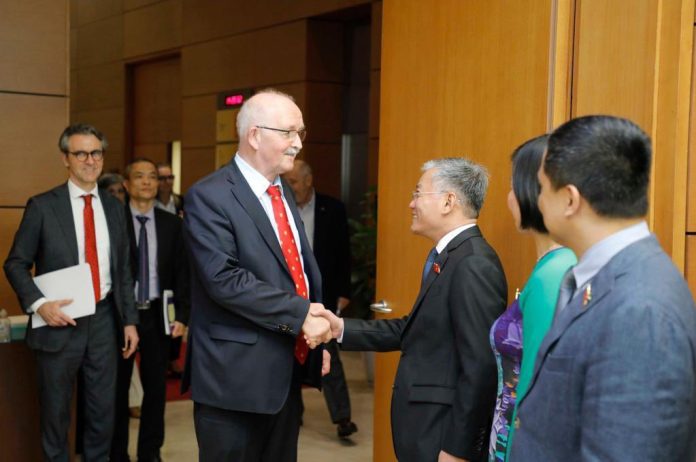A delegation from the European Parliament’s Subcommittee on Human Rights visited the Vietnamese capital Hanoi on 4-6 April. The delegation visit followed the previous visit of the subcommittee in 2017. On site, Members of the European Parliament raised the human rights developments in the country following the ratification of the EU-Vietnam Free Trade Agreement. The delegation stressed the EU’s willingness to further develop its partnership with Vietnam and to cooperate in multilateral fora, including in the UN Human Rights Council. The delegation also recognised the progress achieved by Vietnam in fighting poverty and inequality, which has led to improvements in the quality of life for Vietnamese people.
On another note, the delegation expressed great concern over the worsening human rights situation in Vietnam, and in particular as regards the shrinking space for civil society, abuse of the vague provisions of the criminal code to supress critical voices, the harassment of activists, repression of the freedom of expression, notably in the online space, and of freedom of religion and belief. The delegation underlined the need for Vietnam to fully implement its international and domestic human rights obligations. Members raised specifically those obligations included in the International Covenant on Civil and Political Rights and Sustainable Development Goals (SDGs), including SDG 16 on the promotion of peaceful and inclusive societies, which are also included in the Vietnamese constitution. MEPs stressed their strong conviction that the freedom of individuals is the basis for collective prosperity, and that strong and independent civil society organisations are critical to overcome challenges both in Vietnam and worldwide. The delegation reconfirmed the EU’s standing offer of enhanced cooperation with Vietnam to improve the human rights situation in the country.
The delegation also called for the immediate and unconditional release of all the political prisoners and prisoners of conscience in Vietnam, including leaders of non-governmental organisations, journalists and environmental activists. In this regard, the delegation stressed the need to ensure access to a fair trial for these people.
MEPs also stressed the positive role played by the EU-Vietnam Free Trade Agreement (EVFTA) in facilitating Vietnam’s economic development and the country’s goal to become a middle-income country. They underlined that as an important part of the agreement, Vietnam has committed to improve the human rights situation, and stressed their disappointment that it had not yet materialised.
The EVFTA obligations also include the ratification and implementation of International Labour Organization (ILO) core conventions. Members noted that Vietnamese authorities plan to present the ratification of ILO convention 87 to the National Assembly in 2023. The delegation restated the EU’s principal opposition to the death penalty and called for a moratorium as the first step leading to the eventual abolition in Vietnam. The members took note of the reduction of the number of criminal offences for which the death penalty could be applied, which was introduced in the 2015 penal code, and urged for the deletion of drug-related and other offences from the same list. They also called for amending the state secrets protection law to allow for the publishing of statistics concerning court sentences and executions.
The delegation also discussed the situation of vulnerable groups in Vietnam with their interlocutors. They focused on the situation of women and children, and in particular domestic violence and child labour. Members expressed concern regarding the situation of human trafficking, forced labour, and current laws limiting freedom of religion and belief.
In Vietnam, the delegation met with the Deputy Prime Minister, the Vice-Chairman of the National Assembly’s Committee for Foreign Affairs (NAFAC) accompanied by the representatives from the Committees on Justice and Social Affairs, the Vice-Minister of Justice, the Vice-Minister of Public Security, the Deputy Chief Judge of the People’s Supreme Court, the Vice-Chairman of the Government Committee for Religious Affairs, the Director and members of the Human Rights Institute, the Standing Chairwoman of the Commission of External Relations of the Communist Party’s Central Committee, United Nations representatives, as well as non-state actors.
“We urgently call on the government of #VietNam to clear the way for the civic freedoms they signed up to and become the global progressive voice we would wish for,” wrote on his Twitter account the head of delegation Udo Bullmann (S&D, Germany).
The other members of delegation were Gheorghe-Vlad Nistor (EPP, Romania), Leopoldo López Gil (EPP, Spain), Isabel Santos (S&D, Portugal), Nacho Sánchez Amor (S&D, Spain), Urmas Paet (Renew Europe, Estonia).

